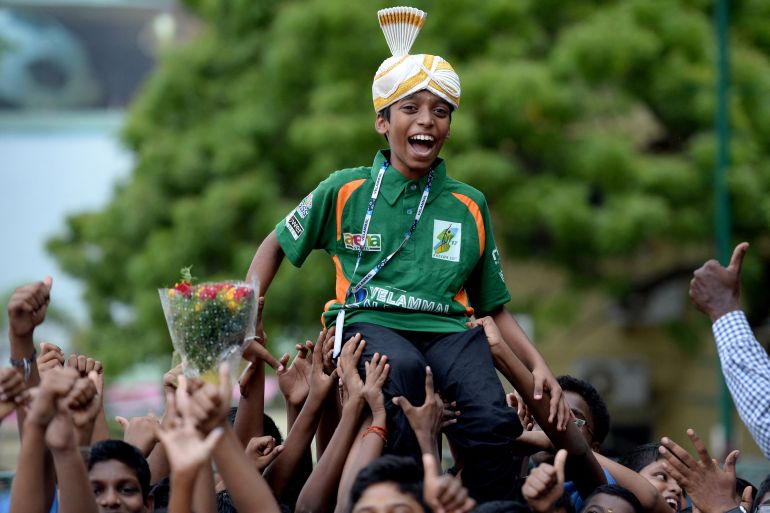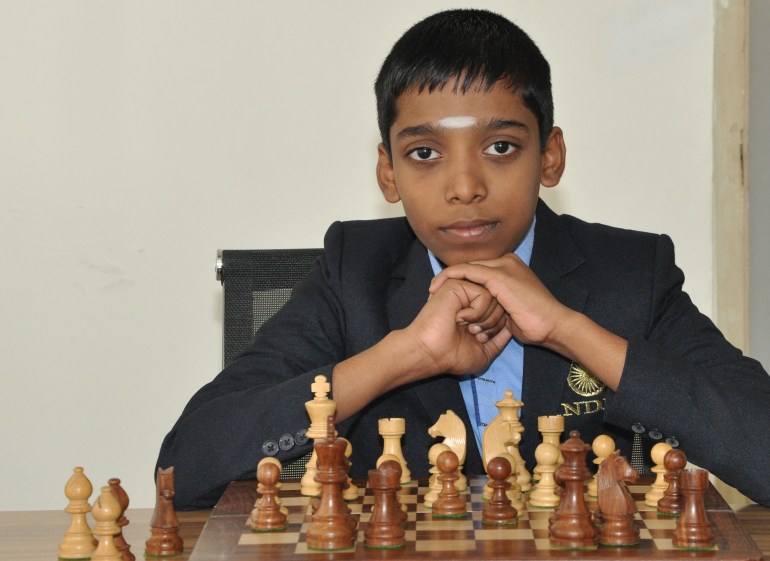How chess prodigy Praggnanandhaa starred in cricket-crazy India
Teenager’s rise to stardom was marked by a stunning win over top-ranked player earlier this year.

New Delhi, India – In India, a nation of more than a billion people who are mostly crazy about cricket, Rameshbabu Praggnanandhaa was drawn towards chess at the age of three.
He watched his sister Vaishali Rameshbabu – enrolled in a chess academy by their father who was miffed at her addiction to television – practice in her room. That is when Praggnanandhaa says he fell in love with chess.
Keep reading
list of 3 itemsMaidan Market: Indian sporting goods market fighting for survival
How athletics is helping India’s Siddi community gain recognition
Initially, he would just play on his own before he started practicing with his 21-year-old sister who became his first role model in the game.
Praggnanandhaa’s rise to success took a steep path. Aged seven, he achieved the title of FIDE Master, the third-highest title a chess player can achieve after the Grandmaster and International Master titles.
Just three years later, he achieved the International Master title, becoming the youngest player ever to accomplish the feat.
More success followed swiftly.
Two years later, in 2018, Praggnanandhaa became the fifth-youngest Grandmaster globally and the youngest Indian to achieve the title. His routine of practicing for hours daily had finally paid dividends.
In February this year, the 16-year-old added another feather to his cap when he beat the world’s top-ranked chess player Magnus Carlsen in the Airthings Masters, an online rapid chess competition.
If you need a reason to smile this Monday evening, all you need to look at, is the smile on Smt Nagalakshmi’s face, mummy to GM R Praggnanandhaa & WGM R Vaishali 🙏🙏 pic.twitter.com/y28qwb4eaX
— arati (@Arati1411) February 21, 2022
Stunning win
It was past 1am in India. Praggnanandhaa, dressed in a pink t-shirt, constantly toyed with his hair, seemingly exhausted.
Carlsen, in a more comfortable setting as the tournament was held during Central European Time, seemed in better spirits.
The game was Praggnanandhaa’s fourth of the night. In the three games prior to that, Praggnanandhaa had won one, lost another, while the third ended in a draw.
For the first 31 moves over 33 minutes into the game, Praggnanandhaa gave a tough competition to Carlsen, a five-time world champion from Norway, until the latter made what the commentators termed “a blunder”.
From there, it took Praggnanandhaa just seven moves to register a stunning victory over Carlsen, becoming the third Indian – and the youngest – to do so since the Norwegian become world champion in 2013.
For a moment, the teenager, who stunned Carlsen in the eighth round of the tournament, could not believe he had defeated the world’s best.
Shortly after his historic win, Praggnanandhaa nonchalantly remarked: “It’s time to go to bed as I don’t think I will have dinner at 2:30 in the morning.”
By the time he woke up in the morning, Praggnanandhaa was in the headlines.
What a wonderful feeling it must be for Pragg. All of 16, and to have beaten the experienced & decorated Magnus Carlsen, and that too while playing black, is magical!
Best wishes on a long & successful chess career ahead. You’ve made India proud! pic.twitter.com/hTQiwznJvX
— Sachin Tendulkar (@sachin_rt) February 21, 2022
“I definitely imagined beating the world’s number one player one day but I had not expected the day will come so soon,” he told Al Jazeera over the phone from Chennai just days after accomplishing the feat.
Younger days
Born in 2005 to Rameshbabu, a bank manager, and homemaker mother Nagalakshmi in Padi, a locality on the outskirts of the southern city of Chennai, Praggnanandhaa would spend most of his younger days playing chess and riding his bicycle.
Rameshbabu said he realised his son was a talented chess player when Praggnanandhaa was eight.
“I never expected he will go this far,” Rameshbabu said of his son’s achievements.
After learning from his sister, India’s Grandmaster Viswanathan Anand became Praggnanandhaa’s idol.
In 2012, Anand had won his fifth world chess championship. On his return to his home city of Chennai, Anand was given a hero’s welcome by a huge gathering at the airport, including a six-year-old Praggnanandhaa.
When the teenager registered his win over Carlsen, Anand tweeted: “Always proud of our talents! Very good day for Praggnanandhaa.”
“It was clear that he is very talented,” Praggnanandhaa’s coach RB Ramesh told Al Jazeera.
“Most of the talented children fizzle out within a few years. When they start winning at a very young age, they become complacent and think that it’s happening to them and it will continue to happen on its own because I’m talented. They don’t work hard.”
Praggnanandhaa practices between six to eight hours daily and barely has time to attend his school or focus on his homework.

But his father insisted it did not mean the teen prodigy, currently in grade 11, is not good at academics.
“As long as he is doing well, I think he should keep his focus on chess,” Rameshbabu told Al Jazeera. “We were not expecting this victory. We are really happy for him. We can’t express it in words.”
Bharat Singh, secretary of All India Chess Federation, told Al Jazeera that in 2005, there were only 10 Grandmasters in India but today there are 73.
“We are probably the only chess federation in the world that conducts 23 national [tournaments] in a year,” he said. Apart from that, Singh said they conduct several international tournaments and nearly 300 rating tournaments in which about 100,000 Indian chess players participate.
“We have 50 percent of junior talent in the world. We concentrate on junior chess,” Singh said.
Pragg the role model
Despite his stunning rise to stardom, the teenager has remained humble and has set his eyes on a larger goal.
“I started getting this attention from the age of seven because I started winning tournaments from that age. I don’t think it changed anything in me. It’s [the win against Carlsen] a big thing of course but I think it’s quite normal. I continue to do what I do,” he told Al Jazeera, adding that he aims to be “in the top 10 in the world and one day become the world champion”.
Praggnanandhaa’s coach Ramesh believes that defeating the world champion in any format will give him a lot of confidence.
“The game has benefitted from his win because more people read about chess and more people read about the young upcoming star. For any sport to develop, you need attractive stars who can inspire the population,” he told Al Jazeera.
“There would be thousands of young children reading about Pragg or watching him on TV. They will say I want to become like him.”